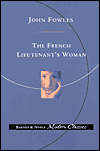|
On the Intrusion of Social Darwinism
Literary Analysis: The French Lieutenant's Woman Spring 1984 by Jeff Dieffenbach |
|||

|
Until the arrival of John Fowles, the lives of Charles Smithson, Ernestina Freeman, and Sarah Woodruff are proceeding in distinct, predictable directions. Charles and Ernestina will be married, and live, if not happily, at least together, for ever after. Sarah, scorned by the Victorian Society from which she has escaped, will cease to bother the identity-seeking Charles. Although Fowles goes so far as to provide for this as an ending, he does not realistically think that it will come to be. Fowles does not see himself so much writing a novel as he does relating a series of events that he is witnessing. He uses his role as an author and as a character, and poses questions and evokes decisions, to present his twentieth-century views on the era of Queen Victoria. Charles, the protagonist, is his medium for this presentation. | ||
|
"Can you not see? He has no right to intrude!
I am a gentleman of the Victorian Age.
This Fowles has no grounds for tempting me this way.
Yes, I am a Darwinist.
I am not convinced of the ways of this era, nor the values of its society,
but no more am I convinced of the wrongfulness of these ways.
It is true that I find 'English society too hidebound, English solemnity too solemn,
English thought too moralistic, English religion too bigoted,' as Fowles states on page 107.
Yet it is these values which still bound my conduct.
I am not ready to revolt, not as Fowles would have me."
Charles' charges against Fowles register weakly with his companion, Doctor Grogan, with whom he frequently finds himself in converstation. "Perhaps," the doctor replies, "perhaps not. You say that you are of the Victorian Age. Well I am not. I am from before this great age, and so I come to be in it as a more objective observer of the events of the past several days. I see Fowles not as intruding, but instead as presenting for you a decision, a choice, which you otherwise deny yourself. Look here, on page 266. You make the decision yourself, not Fowles, to continue on to see Sarah. I think that you are not just a Darwinist, but that you are Darwin. You wish to challenge the ideals of the Victorian Age, the Ernestina'a and the Mrs. Poulteney's. You need only the strength, the initial push, with which to act. You are a thinker, and you wish to succeed, to strive, to be a doer. Fowles says as much when he quotes Darwin, here on page 120.
You can, and wish to be, naturally selected." Charles ponders this, looking out over the moonlit bay, and after a long silence, replies, "Perhaps you are correct, good doctor. I think I see your point. I take it, then, that you are saying that I am hanging on to Ernestina out of convenience, or even fear. She is unquestioning, naive, and loving, the perfect wife for the perfect Victorian gentleman, the epitome of the age which I, just moments ago, was convinced I was a part of. Doctor, I am not that perfect Victorian gentleman." "And Sarah--," Doctor Grogan begins, after taking a sip of his toddy. "Sarah is the evolved species which Darwin has predicted. She has escaped the Victorian Era." Gazing into the dancing flames of the fire, Charles muses for several moments, and then continues. "So Sarah is not a temptation dangled like a carrot before the unknowing jackass, but a catalyst. She has escaped, and she sees the same potential, the same desire, in me. She is leading me. And all the while I assumed that I was the one helping her. Does this make me in your eyes the transition between the Victorian Age and a more liberal age to follow?" "What do you think?" he replies, in his best imitation of Freud, "And what of the three endings Fowles proposes?" "The first must most certainly be ludicrous. It serves to point out to me that I may control my own destiny. I have no obligation to myself to proceed in society's fashion. The second and third endings are more difficult to interpret, however." They sit amid the dull glow emanating from the fireplace in empty silence. Finally he goes on. "I think it matters not which ending I come to, for in both of them, I have escaped. At last I can be an individual. I can be myself." "Cognito ergo sum," Doctor Grogan intercedes. "Exactly. She allows me to transcend the barriers of time. She allows me to be an existentialist, ironically before being such is chronologically possible." Thus Charles, with the help of both Sarah and the doctor, has come to grips with himself. At the cost of his inheritance and his social status, he gains self-awareness. He is steered away from a direction in which he has no wish to travel in life. Fowles has not intruded in Charles' life, but instead given him a choice in it. When Charles unknowingly meets Fowles on the train, "there is something more than disapproval in his [Charles'] eyes" (p. 318), because Charles thinks Fowles insane. If Charles had been aware of his fellow traveler's identity, he would have instead thanked him profusely. Fowles' Charles is one of the first to escape; hence, unfortunately, he has no place to which to escape. It is ill-timed for Charles; for society, the time is right, a portend of the changing times to come.
|
|||
deepbrook.com/portfolio